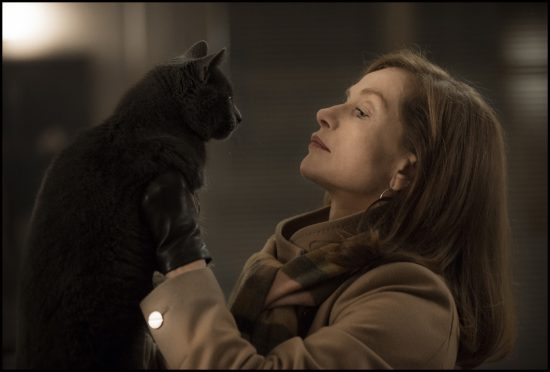Review: Elle – “Paul Verhoeven has consistently been twenty years ahead of the curve”
Dutch director Paul Verhoeven has consistently been twenty years ahead of the curve. Robocop (1987) was accused of being a crude and imprudent example of lowest common denominator Reaganite cinema before its adoration as an anti-capitalistic satirical masterpiece and subsequently sterilised remake, made precisely in the fashion of the accusation pointed at the original. Showgirls (1997) was lambasted for misogyny and exploitative sexism before it started getting screened on University campuses as a feminist riposte. Starship Troopers (1997) was regarded as a fascistic celebration of military violence before its rightful reputation as an ardently anti-fascist, camp parody became the consensus. It seems no one wants to be on the wrong side of history this time around, for Elle, Verhoeven’s first feature in ten years, has been on the receiving end of abundant critical praise not twenty years later, but on pre-release! A novel situation for the Dutchman I’m sure. One must regard this treatment suspect, not least as Verhoeven remains one of cinema’s last true provocateurs, the moral stun grenade of the screen, a descendent of Bunuel and Pasolini and an ally of von Trier and Haneke. If his film can be received with open arms by the mainstream press, with very little moral indignation despite every critic’s blasé insistence that the film is self-evidently ‘controversial,’ what does this say of the films staying power? This isn’t, after all, his best film, but it has certainly been received as such.
If you are aware of the director’s reputation and the films subject matter, rather predictably the film opens to a scene of rape, as if such an introduction is the certifiable way to garner a ‘controversial’ reputation. “What an opening!” the unsuspecting amongst us may say. Fortunately, Verhoeven is no amateur, and rather than divulge in the shock, horror and violence of it, he shoots the scene with such emotional detachment as to normalise the event, to pacify its potential for cheap shock. We do not know the victim in question, nor the identity of the attacker, we look on with the same indifference as the unsuspecting household cat nonchalantly observing the act. After doing his business, the attacker walks away, leaving Michèle (Isabelle Huppert) to brush up the broken ornaments destroyed in the struggle, clean herself up, take a shower and return to life as usual when her son comes to visit.
Only after the act do we get to know Michèle, who is herself detached, a ruthless business owner of a Parisian video game company, divorced, unresponsive to her insipid son and vehement to his dastardly girlfriend. When she does finally reveal the attack to friends, it is told in pre-meal conversation in a nice restaurant – “I suppose I was raped,” she says with indifference. Verhoeven dares us to insinuate that Michèle is complicit in her attack, not only by making her oftentimes unlikeable but also in her involvement with the propagation of images of sexual violence. Only a few hours after the attack is Michèle ordering her employees to make the scenes of violence in their video game more suggestive of sexual assault so as to fetishise it. More subtly, we see Métal hurlant posters for home decor – the violently erotic fantasy comic book. It’s simplistic moralising to suggest that we are desensitised to violence. Haneke is the obvious point of reference in this regard, the same theme being condescendingly explored in his Funny Games films. But whereas Haneke chooses sinister detachment, Verhoeven goes for laughs of the darkest kind. Elle has an aversion to moral absolutism, and to suggest as much does it a disservice. This is as murky as it comes, and it is the film’s amoral observation and faint insinuations that stimulate thought. The fact that she is also the daughter of a famous mass-murderer adds chop to the water..
Verhoeven’s admiration for the character begins to shine as the film progresses. We know the rape has affected her (of course it would), but she refuses to give voice to the fall-out, and no law is involved. Verhoeven does not dare to presume a simple psychology for women, whereby they merely become hysterical and recruit the help of men to resolve their problem – a sexist proposition. Her strength of character and tenacity in the face of her attack place her as a source of regard, someone who refuses to become a victim and indeed submit to any moral preconception. This is the morally murky area Verhoeven best operates in; the film damns society’s absolute lack of ability to account for any degree of love that does not prescribe to established Christian-societal notions. In the rituals of the bourgeoisie and their emotional repression does Verhoeven find much to laugh at, discovering many moments of dark comedy in the illusion of civilisation and refinement, whereby sexual transgression and desire remains hidden in the basement. It is no coincidence that acts of horrific violence occur almost every time classical music plays within the homes of these middle-class bankers, businessmen and writers.
At every turn, Verhoeven has his characters perform the opposite action to what society prescribes. I’d like to say this makes the film unpredictable, but this is not the case. The identity of the attacker and the plot trajectory are morally subversive but narratively predictable when situated within the director’s tradition. As such, Elle is a film that fails to push the boundaries of its director’s sensibilities, even if it does admirably and effectively push the preconceptions of those who watch. In this way, the film, rather ironically, feels safe. Luckily, Verhoeven’s safe is everyone else’s exception, and the film does indeed refuse moral simplicity, but if we can be sure of anything, it is of the films detest for the bourgeois. It is hypocritical moral grandstanding that Verhoeven is most repulsed by, and in his cinematic reflections, we are shown where we flounder, exposed to our double standards, shown the darker heart within.
What an irony that the film was exposed to us members of the press in the most bourgeois of environs – a luxury hotel, where well-to-do middle-class white men and women were engaging in orgies of decadent expense in the lobby bar. The irony had not eluded me; coming out of the screening room of this excellent black comedy, as conservative critics went on to their post-screening dinners and wine receptions, the film was being vocally revered, but not as the incendiary anti-bourgeois moral mind fuck this critic felt it to be, but as a simple ‘whodunit.’ Perhaps the film didn’t make the point sufficiently enough, maybe Verhoeven had lost his edge and finally submitted to the vanilla intelligentsia, or perhaps such discussion was simply too distasteful, an inconvenient interruption to an otherwise pleasant night. I could see the double standard Verhoeven alludes to before me and it was thoroughly disconcerting.
Elle is in UK cinemas from 10th March 2017.











